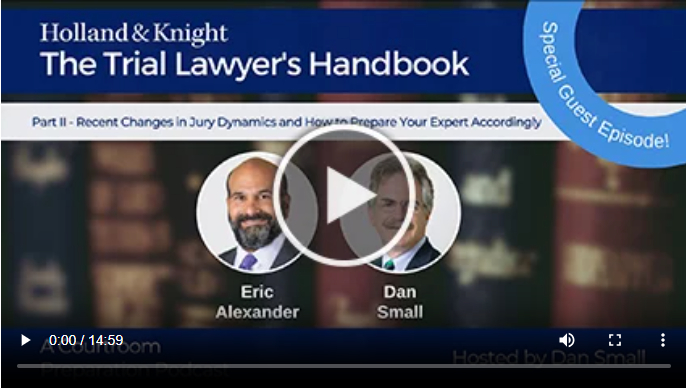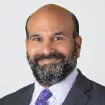- within Consumer Protection topic(s)
- within Strategy topic(s)
In the second part of this special guest episode of "The Trial Lawyer's Handbook" podcast series, litigation attorney Dan Small is once again joined by Partner Eric Alexander, who leads Holland & Knight's Product Liability – Life Sciences Team. This episode's conversation focuses on product liability trials and how they differ from other types of litigation, as well as recent shifts in juror attitudes and the effects on expert witness selection and preparation. Mr. Small shares an anecdote to emphasize that getting the jury to like you isn't just a part of trial, it's the only part of trial. For his part, Mr. Alexander suggests that changes in juror dynamics were likely accelerated by COVID-19 and the associated shutdowns. The attorneys agree that a strong expert nowadays is defined more by the ability to speak "juror's English" than by degrees or professional experience. The dialogue offers a behind-the-scenes look into the world of product liability litigation and the factors that can determine success in the courtroom.
Mr. Small is also the author of the American Bar Association (ABA) book Lessons Learned from a Life on Trial: Landmark Cases from a Veteran Litigator and What They Can Teach Trial Lawyers.
Podcast Transcript
Dan Small: Welcome back to The Trial Lawyer's Handbook podcast. I am delighted to welcome back Eric Alexander, who is a great trial lawyer in our Washington, D.C., office of Holland & Knight, and the team leader of the Product Liability – Life Sciences Team. Eric, welcome back to the podcast.
Eric Alexander: Thanks for having me, Dan.
Dan Small: We talked last time about trials and younger lawyers and how we develop, but now I want to tap into the knowledge that you've gained from these product liability cases. First of all, I should set the stage. Talk to us a little bit about a product liability trial. How is that different from what someone might see on "Law & Order" or wherever they get their information?
Eric Alexander: Well, it definitely is different than criminal trials. I will start with my admittedly biased view that these tend to be hard cases to try because you typically have an injured person who usually is from where the jury's from unless you're doing an MDL trial where both sides waive Lexecon, not to get too technical, and you represent a big company from somewhere else that maybe doesn't have the best reputation in public — no matter how many life-saving medications they made, no matter how many great devices they made, people don't like how much drugs and devices cost. People have a lot of press out there and manipulative online advertising, other things that might influence jury perception. So I think you really start in the hole with those cases defending the companies. The other part of it is, we usually say about these cases is, you win on the case specific, but you lose on the generic. And what I mean by that is, if you're ever going to win one of these cases, you need to have something where you're like, hey, we didn't hurt this person, this is completely unrelated. You need to have a good story about hey, this drug doesn't increase the risk of the problem they have. They had it for an everyday, obvious reason. But if the jury gets mad at you and your client because of all the liability stuff, then you're going to lose.
So part of the job, I think, and it's been my focus in a number of trials and litigations, is to help diffuse the bad guy image. You can't always just hide behind FDA skirts, so to speak. And that's increasingly so, but these typically are approved or cleared devices and drugs. The company's typically going to have a pretty good regulatory compliance story. They're going to have a bunch of legitimate scientists working for them who really care about the improvement of the medical conditions that they're addressing with their products. There's just so much of that sort of side show that is going to get in that you as a defense lawyer in a case like this have to do enough to let the jury focus on the things that you think really matter without getting so angry at your client that they're not going to listen to anything you say.
Dan Small: We had a trial recently where, not a drug case, it happened to be an employment case, but I said to our client and their representatives, "You are right on the law, you are right on the facts, but you are going to lose unless you can get the jury to like you." And they're like, what? Why is that such an important part of the trial? I said it's not an important part of the trial, it's the only part of this trial. And as you know, I do a lot of work preparing witnesses and wrote the ABA's manual on it. We did a lot of work with them just on that, you know, you can't be a robot, you can't be a bureaucrat, you got to be you. And in the end it worked. Have jury dynamics changed in the last 10, 20 years? What do you think?
Eric Alexander: Oh, yeah. I think that the changes have been accelerated over the last five and a half years, which correlates to the beginning of COVID as a pandemic and the shutdowns associated with it. But that accelerated some things that I think were going on already. Couple of things in no particular order. People, because of the internet and because of social media, are increasingly suspicious of experts and don't rely on experts solely because of their credentials. The kind of "do your own research" crowd. We sometimes call it the "death of expertise." People are like, well, I understand this stuff, I don't need to have a Ph.D. to understand a particular issue here. And that generally works against defendants because you're usually on the side of science and what the right interpretation of science is. That's changed.
I think people defer to experts less based solely on their credentials. I think that juries are less likely to be deferential to FDA in particular, other government agencies, but FDA in particular. And that definitely started before this calendar year. That was driven by a number of COVID dynamics. But again, I think it was in place already, just sort of this "independent" thinking that goes on. I mean, I've had jurors in jury selection say things like, "Well, if this is an FDA-approved product, I'd be less likely to think that it's safe." So that's a change. I mean, I think it used to be, hey, I got this person who got their M.D. from Harvard and they have a full professorship here and they're really an amazing expert. You're not necessarily going to get much traction with that person unless they're also really good at explaining and, maybe like you said, sufficiently personable and likable that the jury wants to believe them. But I think it's harder now than it used to be.
Dan Small: So talk to me a little bit more about experts. How do you prepare your expert given that environment and given the challenges they face?
Eric Alexander: Well, obviously it starts with who you pick, right? You pick somebody who's good, who's personable, who's certainly legitimately qualified, that doesn't have significant baggage. You know, all of that is true. You realistically evaluate your needs for the case of the litigation in terms of who your experts are, how their opinions fit together, avoiding conflicts, all of that. And then what you're thinking is like, you got through the Rule 702 motions, you're at trial, in my typical posture the other side's gone. They've rested their case or they're about to rest, and I'm preparing our expert who's going to lead off and say a version of the "My Cousin Vinny" opening, everything the other side said was expletive deleted, depending on your rules for expletives. I don't really know, Dan. How do you get that guy or that person ready? And again, that involves being able to be honest with them.
I do mock crosses. I do mock directs. I typically scope out direct, do a hard mock, go through direct again with fine tuning to account for things that were successful or not in the mock and invite them to come back with, oh, I need to redo that area, I think I can do better. But in the middle of that — not that you're coaching the substance of answers — you have say, you know, that wasn't so great, that part that you did, or, and this goes for all the witnesses, we were just talking about this last time in connection with the jury's eyes on you, where is the witness looking when questioning is happening from either side? How respectful is the witness of the judge and the court staff? I had a witness I put on a couple of trials who has three doctorates, couple of masters, absolute world expert in his field, a genius, a great expert. But the best part is when you get him to stand up and teach and talk like a regular person. And listen, I think that that is part of what you have to do. Again, your honesty about you and your witness and how you come across and how your dynamic is. Figure out where they're best. Are they best on their feet as a teacher? Are they best in the box? Are they a little too stiff? Can you loosen them up? And that has to come out from your prep where you try different things and you go through different ways of conveying your message.
And of course, listen, we all know you can't have a dramatically different demeanor on cross than on direct. And we know that you better know how to get impeached in addition to, as the lawyer, know how to impeach. I think that the vibe, the feel of, hey, this person's incredibly qualified, but I also kind of like her. And I think maybe I understand that. I wasn't talked down to, I was allowed to get enough information to connect the dots myself. Juries like to connect the final dots and not have it all spelled out for them. But that's an assessment of the witness. Maybe sometimes you videotape them and you show them the video. Maybe you just give the feedback. But you have to start from the beginning of picking somebody who you think is going to be able to take that sort of direction or guidance at trial about like, you know, you're not talking to third-year medical students here, dude. We need to dumb it down a little bit. Let's stop the alphabet soup, a lot of people don't want to hear that. They're going to be like, pssh, I know what I'm doing. So I think there are a lot of parts of what I just said, but it does come down to, as a lawyer, it's not the words on the page. It's not the degrees on the CV. It's the ability to convey the message to the jury and then have it stand up during cross.
Dan Small: No, absolutely. We just had a case where we had an absolutely brilliant MIT Ph.D. physics professor as an expert who did a brilliant report that really turned the case on its head. But when trial counsel was moving forward towards depositions, they realized that he was accustomed to speaking with other brilliant MIT physics professors. And they called me in to basically teach him English. He knew English very well, but a juror's English. So let me just quickly, I want to transition to corporate witnesses, Rule 30(b)(6) or whatever the rule is. Most of your cases, you have a corporate witness, is that right?
Eric Alexander: Yeah, usually the plaintiffs try to present the corporate case through video depositions. Judges sometimes allow that, sometimes they're like, hey, if they're available, they can be presented and I prefer that they be live so I can rule on it. Going through deposition transcripts with counter-designations and objections is a giant time suck for judges.
Dan Small: And torture for the lawyers, I should say.
Eric Alexander: Oh, my God, yeah. Mostly they like a video show because their view is that the witnesses will be better prepared at trial than they are in deposition and that a lot of lawyers make a mistake, from my perspective, in terms of not getting good testimony from their own witness at a deposition. I don't think there's anything called a discovery deposition in the world anymore. Every corporate employee who's deposed, in one of my cases every third party who's deposed, I mean, that's potentially trial testimony, so you got to be ready upfront. But at trial, we often present somebody as a corporate witness who puts a nice face on the company. Sometimes that will be somebody the jury's already heard from via deposition if the judge is letting plaintiffs do that and won't force them to decide. Just ask your questions, the person's coming live. And then you have to deal with a lot of scope issues. But it is as simple as putting a good face on the company is job one.
Dan Small: That's great, no, absolutely. Eric, you've been very generous with your time. I appreciate it. Any final thoughts for our trial lawyers listening?
Eric Alexander: I'll go back to something we talked about last time, which is the young lawyer. What lawyer you might become when you start out and you finally get your chance in the typical Big Law kind of context. You finally get a chance to do an important witness at a trial. You're standing up, you're there. I think that smart, well-prepared, confident lawyers can do a good job with opposing super qualified, really experienced experts. I think that that's one permutation of it, but it translates to, if you can find the confidence, not overconfidence, but if you can find the confidence, you have the technique, you have the knowledge, I think that the young lawyers should know that they can get it done and know that they can, over time, develop enough of their own shtick, their own ability to stand up and be who they are and be effective at trial instead of being scared and formulaic.
I will tell you that I don't like formulaic directs and crosses in a lot of ways. I don't agree with the idea that you can't win your case and you need to rein it back. But I think that you start with the idea that scoring points by being aggressive, even with the other side's witness, by establishing really important things under a difficult context is a possibility. And I hope young lawyers are emboldened to, with appropriate CYA, take some chances in there and at least think about, is there a way I can get something really helpful to win this case? As opposed to, well, I'm just going to ask so-and-so a couple of questions. That's selling yourself short, and I would encourage the lawyers out there, particularly on the defense side and people representing companies getting sued over product liability and other kind of big serial litigation, that sort of thing, that you don't have to just play it safe and you don't have to be overly cautious all the time.
Dan Small: Great advice, Eric Alexander, team leader of Holland and Knight's Product Liability –Life Sciences Team, and I can use the word extraordinary trial lawyer and teacher of trial practice. Thank you so much for joining us on The Trial Lawyer's Handbook Podcast.
Eric Alexander: Thanks for having me, Dan.
The content of this article is intended to provide a general guide to the subject matter. Specialist advice should be sought about your specific circumstances.



